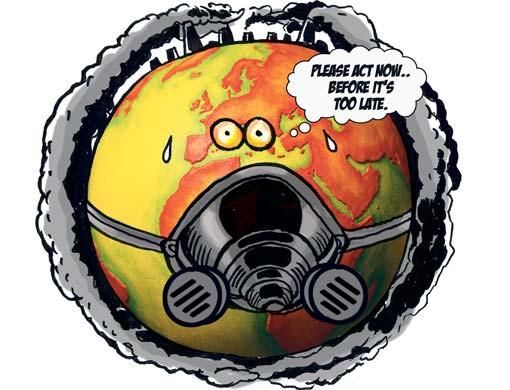The drama at the Bali conference on climate change had India playing a crucial role in bringing the developing nations of the G77 into a last minute agreement with the 36 industrial nations which had signed up to the Kyoto Accord, as well as the United States which had shamelessly refused to sign the Kyoto Accord.
Finally everyone now agrees that the world is getting warmer, and that this is very dangerous indeed for the long term survival of the human race. Very few issues can possibly be more significant, yet it has been all too easy for some governments to shelve the economic pain of implementing the solutions, because the issue is not yet immediate.
George W. Bush's administration in the United States refused to agree to the binding targets required by Kyoto, arguing that the industrial nations did not need to commit to any targets if the nations of the G77, described as "developing" nations, did not have the same commitments.
At the end of the Bali conference, India and China scored a success as the leaders of the G77 since they managed avoid a split in the G77, but they also got the final Bali agenda to exclude binding targets on reduction of greenhouse gases by developing nations.
No one denies that too much carbon dioxide is being produced as humanity burns various fossil fuels, and everyone now agreed that this is a major issue. But the developing nations do not want to commit to the costs of changing their industries to meet the same standards as more industrial countries, which would put them at a distinct disadvantage in the competitive global economy.
Starting point
Changing whole economies at this level is not something that can be done by force, and any talk from the more hawkish industrial governments of trade sanctions on non-performing developing economies would be very counter productive. What happened at Bali was that all the world's nations agreed that something had to be done. But having decided on that admittedly vital starting point, the agreement on what are the next steps was disappointing.
The agenda outlined a roadmap on how discussions will continue till the end of 2009 on how to reduce emissions, leading to a treaty that will come into effect in 2012. The problem is that a roadmap is not the same as a plan to deal with the issue of global warming, even if the roadmap did manage a broad target that richer countries should aim to half their emissions by 2050.
Without any clear targets or expectations of reduced emissions, and with no suggestions on which countries should lead the way and by how much, the agenda was bland enough that everyone could sign it. However, the important symbolism of the agreement in Bali is that all sides agreed to continue talking.
But climate change is coming fast and as the diplomats of the world keep talking, the world will get warmer and less safe for human beings. It is the responsibility of this generation to act, and just because we are the last generation that can ignore global warming and continue fairly normal lives with impunity, does not mean that we should get away with doing nothing.
There are two challenges. The main one is to reduce the amount of carbon dioxide going into the atmosphere, and the other is to reduce the amount of carbon dioxide already in the atmosphere. The most important is the first, and finding ways to ensure reductions of emissions is heart of the dispute about how to act. Governments will have to apply tough new regulations covering all sorts of activities, including businesses, offices, and homes which will force people and companies to reduce emissions. This will all cost money, and the disputes over how to react to global warming are actually disputes about who will pay for the tougher standards.
Useful ideas
The Bali agenda did include some interesting and very useful new ideas like an Adaptation Fund to help poorer countries deal with climate change, and it set up institutions to encourage transfer of cleaner technologies to countries to help them cut emissions. It also encouraged more use of carbon capture to take carbon dioxide out of the atmosphere and store it underground, which is something that the oil producing countries of the GCC are already working on, even if they have not spoken about it very much and certainly have not given any public targets.
The Gulf states participated in the Bali conference, but their representatives did not make of their countries' strong position in carbon capture. The Gulf states are probably leading the world in testing how to use this new technology, and will soon be able to show the rest of the world how it can be done to best advantage. While no substitute for reducing emissions, carbon capture is the only substantial new way to cut the amount of greenhouse gas in the atmosphere, helping the natural effects of large forests and ultraviolet radiation.
Ultimately all countries will have to act, and targets have to be applied. Global warming is not something that can be ignored. If the debate coming out of the Bali process manages to shift the focus of action way from bargaining over targets, to more constructive plans on how to mobilise transfer of technology and organise financial support for implementing new technologies, it will have made a useful change to a vital issue.









